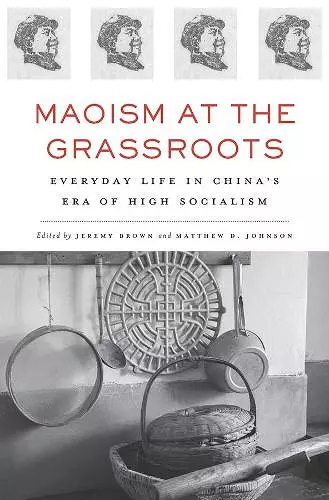Maoism at the Grassroots
Everyday Life in China’s Era of High Socialism
Jeremy Brown editor Matthew D Johnson editor
Format:Hardback
Publisher:Harvard University Press
Published:29th Oct '15
Currently unavailable, and unfortunately no date known when it will be back

The Maoist state’s dominance over Chinese society, achieved through such watersheds as the Great Leap Forward and the Cultural Revolution, is well known. Maoism at the Grassroots reexamines this period of transformation and upheaval from a new perspective, one that challenges the standard state-centered view. Bringing together scholars from China, Europe, North America, and Taiwan, this volume marshals new research to reveal a stunning diversity of individual viewpoints and local experiences during China’s years of high socialism.
Focusing on the period from the mid-1950s to 1980, the authors provide insights into the everyday lives of citizens across social strata, ethnicities, and regions. They explore how ordinary men and women risked persecution and imprisonment in order to assert personal beliefs and identities. Many displayed a shrewd knack for negotiating the maze-like power structures of everyday Maoism, appropriating regime ideology in their daily lives while finding ways to express discontent and challenge the state’s pervasive control.
Heterogeneity, limited pluralism, and tensions between official and popular culture were persistent features of Maoism at the grassroots. Men had gay relationships in factory dormitories, teenagers penned searing complaints in diaries, mentally ill individuals cursed Mao, farmers formed secret societies and worshipped forbidden spirits. These diverse undercurrents were as representative of ordinary people’s lives as the ideals promulgated in state propaganda.
As a work of cultural history, Maoism at the Grassroots seeks to complicate interpretations of China’s Mao era (1949–1976) through an examination of diverse and shared experiences of everyday life… As in the best edited volumes, each section of this book is nicely linked to the others and the authors make connections across the chapters rather than writing in isolation… This book is a must-read for scholars who work on the People’s Republic of China and will prove rewarding as well to anyone curious about ordinary life under Communist Party rule. Maoism at the Grassroots also makes an important intervention in the larger project of writing modern Chinese history. Until recently, Western books on China were primarily written by white men and the occasional white woman. This volume features scholarship from an impressive array of both Western and Chinese academics, many of the latter being translated into English for the first time. This marks a turning point in the production of historical scholarship on the Mao era, and hopefully is an indication of growing collaboration among scholars in different parts of the West and in China. -- Sarah Mellors * Los Angeles Review of Books *
A new generation of Chinese and Western scholars is enriching the history of Mao Zedong’s China with material from discarded personnel files, diaries, and unpublished manuscripts purchased from paper recyclers, as well as from recently opened local archives. Their view from below challenges the clichéd images of regimented masses fanatically loyal to the revolution. -- Andrew J. Nathan * Foreign Affairs *
For years, Maoist China was opaque from the outside—interpretable only by what a trickle of refugees said or by inference from government references to ‘the masses.’ That bland term is now passé, but the Western tendency to homogenize the common folk of China persists, especially in fields related to international relations, where scholars and journalists casually refer to ‘the Chinese’ as if government rhetoric described everyone. Maoism at the Grassroots is a magnificent antidote to this bad habit. -- Perry Link, author of An Anatomy of Chinese: Rhythm, Metaphor, Politics
Maoism at the Grassroots showcases the exciting new scholarship being produced by the rising generation of historians of the People’s Republic of China. These chapters portray Mao-era society and politics with startling intimacy and humanity, drawing on a range of new sources that bring everyday experiences at the grassroots into sharp focus. -- Andrew G. Walder, author of China Under Mao: A Revolution Derailed
One of the many laudable features of the book is that it combines the work of Western and Chinese scholars…This volume shows what can be accomplished when both sides are represented. It is filled with memorable essays. -- Ian Johnson * New York Review of Books *
ISBN: 9780674287204
Dimensions: unknown
Weight: unknown
480 pages